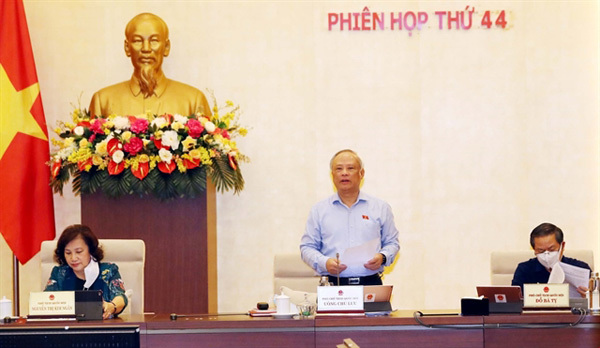
The Government has proposed adding eight draft laws in the 2020 law and ordinance building agenda of the National Assembly (NA), said Minister of Judicial Affairs Le Thanh Long at the ongoing NA Standing Committee session on Tuesday in Hanoi.
 |
| NA Vice Chairman Uong Chu Luu chairs the meeting on Tuesday morning. |
The Government has proposed adding eight draft laws in the 2020 law and ordinance building agenda of the National Assembly (NA), said Minister of Judicial Affairs Le Thanh Long at the ongoing NA Standing Committee session on Tuesday in Hanoi.
The Government also proposed removing the draft amendments and supplements to the Land Law from the legislative programme this year and delaying its discussion until meetings next year.
The adjustments increased the number of draft laws to be discussed in the rest of 2020 to 24, said Long.
NA deputies on Tuesday also discussed the working schedule of next year with more draft laws to be approved.
The Government proposed submitting two draft laws for approval to the 11th session of 14th NA in March next year. They are the draft revised law on HIV/AIDS Prevention and Control, and the draft revised Law on Road Traffic.
At the first session of the 15th NA in July next year, deputies will focus on personnel work so no laws have been proposed for the agenda.
At the second session of the 15th NA next October, deputies are expected to approve the draft revised law on emulation and rewards and give opinions on five draft laws including revised laws on inspection, insurance business and intellectual property rights.
Hoaang Thanh Tuung, chairman of the NA Committee of Legal Affairs, said the committee agreed with the removal of the draft revised land law from the 2020 agenda but asked the Government to continue to complete the bill to submit to the NA at the meeting next October.
Environmental protection discussed
In the afternoon, deputies commented on the draft law amending the Law on Environmental Protection.
Minister of Natural Resources and Environment Tran Hong Ha said new problems and challenges that had arisen showed the urgent need to amend the law.
Specifically, the current law had not been updated with rapid changes of market mechanisms and some new regulations were only at the framing level and did not ensure enforcement, he said.
“Our country's environment is becoming more and more complex, environmental quality in some localities has fallen below the allowed level and is no longer capable of receiving waste,” Ha said.
The draft law specifies 13 policy groups that have been assessed for impact on people’s life. From the initial seven policy groups, the Government has added six new groups, together with the impact assessment report for all 13 groups.
At the meeting, the deputies assessed that the revision of the 2014 Law on Environmental Protection was necessary to overcome shortcomings. They agreed with the Government's proposal to expand the scope of the law.
Speaking at the meeting, National Assembly Chairwoman Nguyen Thi Kim Ngan mentioned the three pillars of sustainable development, namely economic, social and environmental.
“Environmental protection issues are very important, so the Law on Environmental Protection needs to address inadequacies and introduce regulations suitable to the country's conditions and circumstances,” she said.
While stressing "do not trade the environment for economic development", Ngan also proposed environmental standards should not hinder economic development.
“Everyone has the right to live in a clean environment and has an obligation to protect the environment. This law must institutionalise this content and at the same time raise awareness, responsibility and obligations of the people," she stated.
Regarding the regulations on the minimum spending level of 2 per cent of the total State budget expenditure for environmental protection, Ngan said increasing the proportion of State budget spending on environmental causes was essential.
“However, the basis for that 2 per cent of State budget expenditure must be clarified and reported to the National Assembly,” she said.
Head of the National Assembly Ombudsman Committee Nguyen Thanh Hai proposed increasing sanctions for environmental violations to ensure deterrence.
In a landmark move, she said individuals and communities should be entitled to initiate a lawsuit and claim compensation for environmental damage.
Currently, only the local People's Committees of communes, provinces and the Ministry of Natural Resources and Environment are included in the law, but these entities have not yet sued to claim environmental damages as they mainly apply for administrative fines.
“With the view of a very big revision this time we should expand the right to sue and claim for environmental compensation to individuals and communities as they are the most affected," Hai said.
Regarding waste management, the deputies agreed on an approach to regulations to promote solid waste sorting at source.
However, as the draft law stipulates the compulsory classification of solid waste at source in containers and containers for households and individuals in urban areas, many deputies suggested reviewing and supplementing the roadmap regulations applicable to rural areas to ensure uniformity and efficiency.
(Source: VNS)





